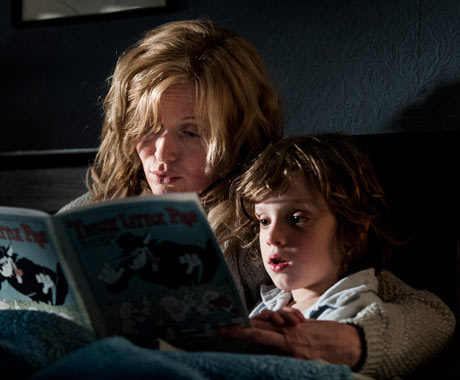At every Toronto After Dark Fest, there's at least one film that rides a wave of palpable buzz and has attendees clamouring to see it. Last year, it was the hilarious and wholly twisted morality tale Cheap Thrills, and this year, right from the beginning, everyone seemed to be talking about The Babadook. The Kickstarter-funded Australian horror film sold out so early that a second midnight screening was tacked on at the last minute — a first for TADFF. While The Babadook's trailer makes it look like your standard creepy kid haunted-house shocker a la Insidious, the film distinguishes itself by subverting these expectations; it's a slow-burner with a surprisingly moving emotional core.
There are two characters at the heart of this story, and all others are more or less incidental. Amelia (Essie Davis) is a widowed single mother living in a big, empty house with her son, Samuel (Noah Wiseman). It's soon made clear that they are both still reeling from the loss of Sam's dad six years earlier. Sam, played with brilliantly feral intensity by Wiseman, is in the phase where he's both frightened by everything and an unholy terror: he sneaks a homemade crossbow to school, refuses to sleep in his own bed and has a tendency to throw screaming fits. Each day, Amelia slogs through a lifeless job as a caregiver at an old folk's home and spends the rest of her time struggling with Sam, her face etched with exhaustion and a growing sense of futility. One night, she discovers a strange book on Sam's bookshelf — a black and white pop-up book hiding a black-clad, caped figure in a top hat with a carnivorous smile and long clawed fingers. Amelia soon realizes that the book is completely inappropriate for her disturbed child, and snaps it shut, but it's too late. The Babadook has invaded, and is out for her son — and Amelia's mind.
Working with a limited budget, director Jennifer Kent has done wonders with practical effects. The Babadook itself is all angles and endless shadows, and feels like a ghoul pulled straight from The Cabinet of Dr. Caligari. Amelia and Sam's house is painted in bleak institutional greys and blues, and as the movie progresses, the edges of reality begin to fray and feel increasingly claustrophobic. However, the film's real strengths lie not in cheap jump scares (there aren't many) but in its effective adoption of the monster as a metaphor for grief. Like the Babadook, grief is haunting, etches you for life and never truly leaves. Through their captivating and fearless performances, Davis and Wiseman ensure that we're desperately rooting for their survival — not only to endure this monstrous invasion, but also to overcome the paralyzing weight of loss.
(Causeway Films)There are two characters at the heart of this story, and all others are more or less incidental. Amelia (Essie Davis) is a widowed single mother living in a big, empty house with her son, Samuel (Noah Wiseman). It's soon made clear that they are both still reeling from the loss of Sam's dad six years earlier. Sam, played with brilliantly feral intensity by Wiseman, is in the phase where he's both frightened by everything and an unholy terror: he sneaks a homemade crossbow to school, refuses to sleep in his own bed and has a tendency to throw screaming fits. Each day, Amelia slogs through a lifeless job as a caregiver at an old folk's home and spends the rest of her time struggling with Sam, her face etched with exhaustion and a growing sense of futility. One night, she discovers a strange book on Sam's bookshelf — a black and white pop-up book hiding a black-clad, caped figure in a top hat with a carnivorous smile and long clawed fingers. Amelia soon realizes that the book is completely inappropriate for her disturbed child, and snaps it shut, but it's too late. The Babadook has invaded, and is out for her son — and Amelia's mind.
Working with a limited budget, director Jennifer Kent has done wonders with practical effects. The Babadook itself is all angles and endless shadows, and feels like a ghoul pulled straight from The Cabinet of Dr. Caligari. Amelia and Sam's house is painted in bleak institutional greys and blues, and as the movie progresses, the edges of reality begin to fray and feel increasingly claustrophobic. However, the film's real strengths lie not in cheap jump scares (there aren't many) but in its effective adoption of the monster as a metaphor for grief. Like the Babadook, grief is haunting, etches you for life and never truly leaves. Through their captivating and fearless performances, Davis and Wiseman ensure that we're desperately rooting for their survival — not only to endure this monstrous invasion, but also to overcome the paralyzing weight of loss.
